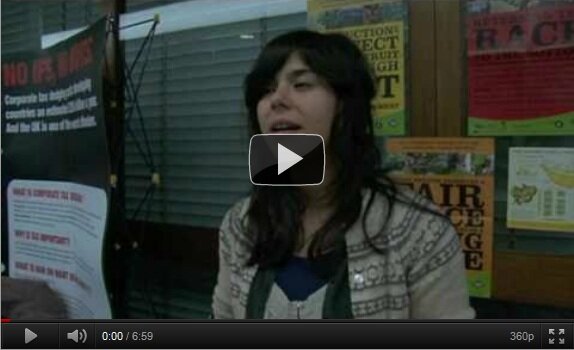Almost all of the Fairtrade nuts in UK supermarkets come from an organisation called Liberation Foods CIC which is anything but a usual company.
It is the world’s only Fairtrade nut company and its biggest shareholder is a co-operative of the very nut farming and gatherering groups which supply the nuts it sells. These groups represent more than 22,000 nut producers.
This co-operative – the International Nut Producers’ Co-operative (INPC) – includes peanut and cashew nut farmers from NICARAGUA , peanut farmers from EL SALVADOR and Brazil nut gatherers from BOLIVIA , BRAZIL and PERU as well as farming groups in Malawi, Mozambique and India.
The INPC meets regularly to discuss issues and support its members – no mean feat when it includes farmers speaking four different languages and spanning three continents. Its members supply around eighty per cent of the UK’s Fairtrade nuts to major supermarkets – including Tesco, Sainsbury’s and Morrisons – and for their ‘own label’ nut products and is the business behind Harry’s Nuts!, the nutty snacks and peanut butter from comedian Harry Hill.
Fairtrade to its very kernel, Liberation Foods was established to benefit, support and work alongside smallholder farmers and nut gatherers. The whole company has that as its vision – even Harry Hill makes no money from the Harry’s Nuts! brand. He backs the brand to back the farmers. Liberation’s other shareholders are fair trading organisations and ethical investors.
The company provides a vital link between the farmers and gatherers, UK consumers and products in shopping trolleys. As Brazil nut gatherer Thomas Kalappura said on a visit to Tesco, “These nuts will recognise me!” The producers are guaranteed a fair deal for what they grow and gather, plus a Fairtrade premium to invest in their communities.
In the Amazon the existence of Liberation has prompted the formation of the Tri–Nation consortium of six Brazil nut co-operatives operating in the same bio region across three national boundaries – Bolivia, Brazil and Peru. These organisations previously competed with one another but are now collaborating on international sales, sharing processing capacity and on a project to capture and sell carbon credits in recognition of their role in preserving the Rainforest (because of the guaranteed fair price which comes with Fairtrade, the gatherers are not tempted to make extra money by cutting down the precious timber – hugely important for the environment).
Casildo Quispe, of Cooperativa Integral Agroextractivista Campesinos del Pando (COINACAPA) Brazil nut gatherers in Bolivia says the Fairtrade premium has been of great benefit to the 270 gatherers in his organisation as some of the money is used to reimburse medical costs. “One of our gatherers, Luciano, who is 57, had cataracts on his eyes. He could hardly see and thanks to the Fairtrade premium he was able to have an operation and this has changed his life. The father of another member was working and a tree fell and hit him hard on his head. Because of Fairtrade they could take him to the best hospital – they knew Coinacapa had the resources to pay the bill and his family knew he would be well looked after. This gives such a feeling of security that there is help if anything goes wrong.”
So Fairtrade has brought the first good quality health care to the gatherers – which has brought with it a real sense of dignity that they are able to have the same kind of care as rich people. The working life of the gatherers has also been improved. Casildo adds: ”Each of the gatherers has been given a machete. They use these to open up paths into the jungle as they go gathering Brazil nuts which have fallen from the high trees on to the ground. This make life much easier as they need to access places in the Amazon Rainforest to find the pods which hold the nuts. They also use the machetes to break open the pods.
“Before this company was formed we sold to local middlemen for lower prices. If someone needed to go to the doctor they would have to borrow money from the owner of the land and then be in their debt – they would have to promise to commit all of their Brazil nuts to the landowner. This shows the difference Fairtrade has made.”
Premium money has also been used for the construction of ‘payoles’ – places to keep nuts safe from water, animals, petrol and chemical contamination, to ensure the quality of the nuts is maintained. Here they can be safely stored, cleaned and selected for export.
Casildo explains: “Before Fairtrade, we didn’t know much about exporting or about how commodities like rice, oil, sugar were bought at very low prices but sold are very high prices. People used to work only for the traders and there was a lot of exploitation. After each harvest producers would end up in debt and each year they were working to pay of the previous year’s debt. With the premium of the sales in supermarkets in the UK, we will be able to improve our facilities, improve the quality of our nuts and our infrastructure. Liberation is here to improve our lives.
Another gatherer Benedicto Gonzalez adds: “Since we started the co-operative it’s as if we’ve gained our freedom. It feels like we’re not slaves any more. We have more income, more work and more dignity.”
Many people still think of Fairtrade as being about bananas, coffee, tea and chocolate. Liberation wants everyone to go NUTS for Fairtrade as well. Please check the Harry’s Nuts! Facebook page www.facebook.com/harrysnuts and the website www.chooseliberation.com for more information.
Conference: LatinAmerica2011 Adelante! Making a better world possible
9.30am-5pm Saturday 3 December 2011Venue: Congress House, Great Russell Street, London WC1B 3LS
Tickets £10 waged £6 unwaged Tel:
